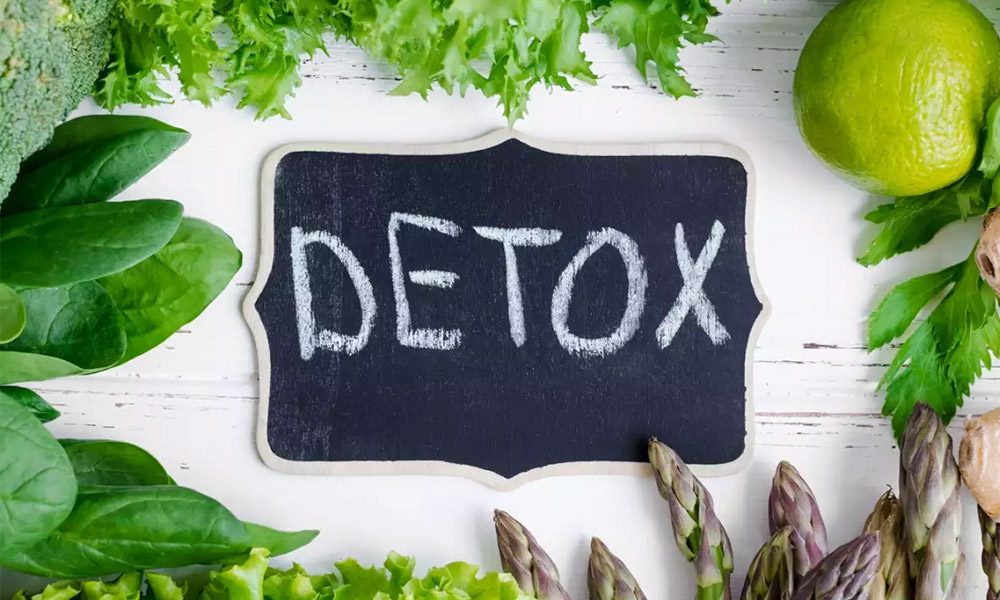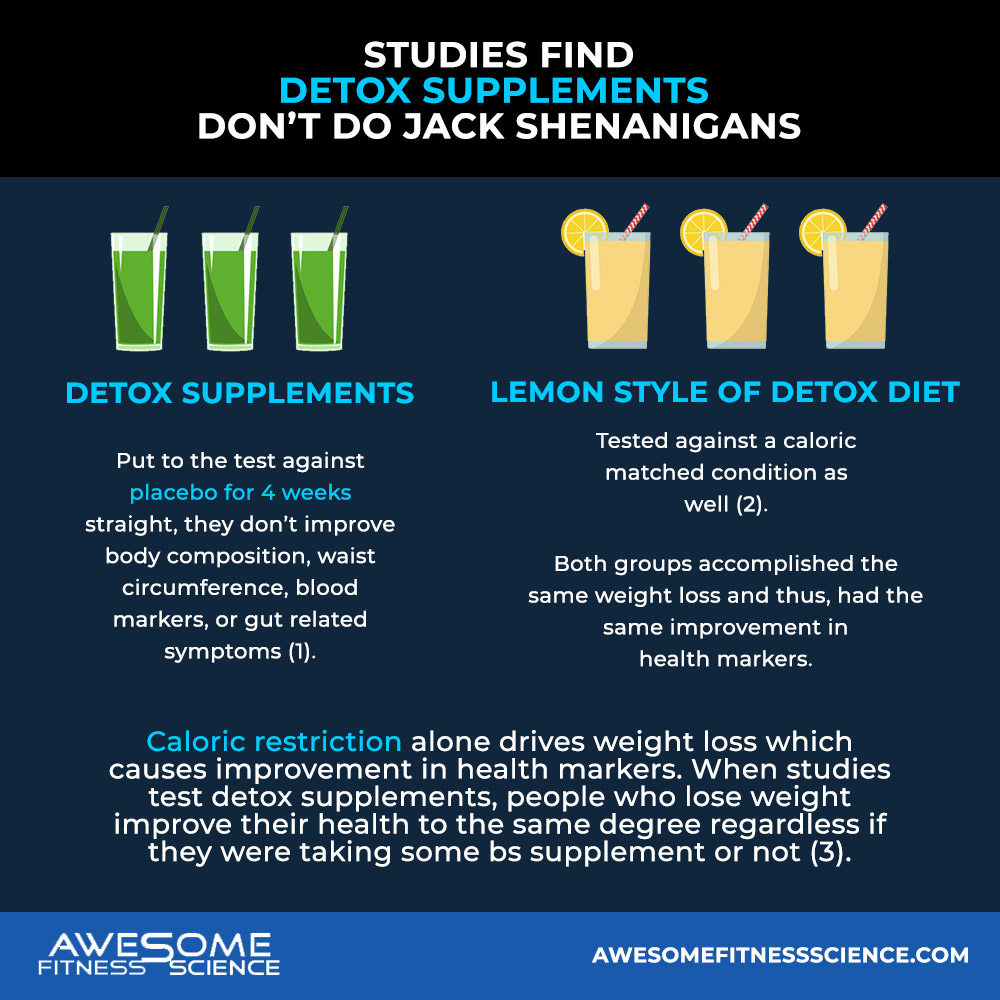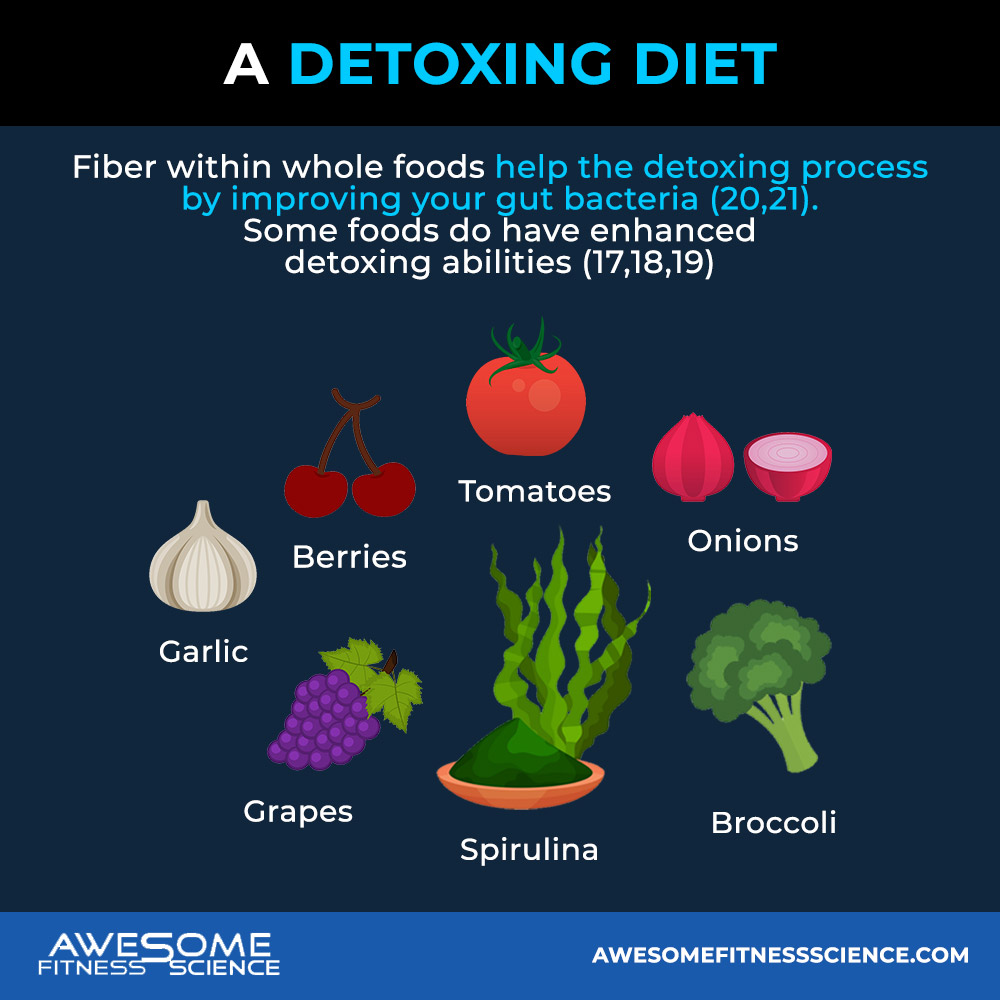1.
Additional informationFundingThis study was funded by
an external grant awarded to the investigators of the Human Performance Lab at
the University of Mary Hardin-Baylor by MusclePharm and the International
Society of Sports Nutrition. All testing was con. “A Purported Detoxification
Supplement Does Not Improve Body Composition, Waist Circumference, Blood
Markers, or Gastrointestinal Symptoms in Healthy Adult Females.” Taylor
& Francis,
https://www.tandfonline.com/doi/full/10.1080/19390211.2018.1472713.
2.
Kim MJ. “Lemon Detox Diet Reduced Body Fat, Insulin
Resistance, and Serum HS-CRP Level without Hematological Changes in Overweight
Korean Women.” Nutrition Research (New York, N.Y.), U.S. National
Library of Medicine, https://pubmed.ncbi.nlm.nih.gov/25912765/.
3.
SW;, Kim JA. “Effects of the Dietary Detoxification
Program on Serum γ-Glutamyltransferase, Anthropometric Data and Metabolic
Biomarkers in Adults.” Journal of Lifestyle Medicine, U.S. National
Library of Medicine, https://pubmed.ncbi.nlm.nih.gov/27924283/.
4.
H;, Klein. “Detox Diets for Toxin Elimination and
Weight Management: A Critical Review of the Evidence.” Journal of Human
Nutrition and Dietetics : the Official Journal of the British Dietetic
Association, U.S. National Library of Medicine, https://pubmed.ncbi.nlm.nih.gov/25522674/.
5.
“Persistent Organic Pollutant.” Wikipedia,
Wikimedia Foundation, 22 Oct. 2021,
https://en.wikipedia.org/wiki/Persistent_organic_pollutant.
6.
Tchounwou, Paul B, et al. “Heavy Metal Toxicity and the
Environment.” Experientia Supplementum (2012), U.S. National Library of
Medicine, 2012, https://www.ncbi.nlm.nih.gov/pmc/articles/PMC4144270/.
7.
L;, Jackson. “Adipose Tissue as a Site of Toxin
Accumulation.” Comprehensive Physiology, U.S. National Library of
Medicine, https://pubmed.ncbi.nlm.nih.gov/28915320/.
8.
La Merrill. “Toxicological Function of Adipose Tissue:
Focus on Persistent Organic Pollutants.” Environmental Health Perspectives,
U.S. National Library of Medicine, https://pubmed.ncbi.nlm.nih.gov/23221922/.
9.
L;, Makkapat. “‘Green Smoothie Cleanse’ Causing Acute
Oxalate Nephropathy.” American Journal of Kidney Diseases : the Official
Journal of the National Kidney Foundation, U.S. National Library of
Medicine, https://pubmed.ncbi.nlm.nih.gov/29203127/.
10. K;,
Kesavarapu. “Yogi Detox Tea: A Potential Cause of Acute Liver Failure.” Case
Reports in Gastrointestinal Medicine, U.S. National Library of Medicine,
https://pubmed.ncbi.nlm.nih.gov/29204300/.
11. Kim
. “Fate and Complex Pathogenic Effects of Dioxins and Polychlorinated Biphenyls
in Obese Subjects before and after Drastic Weight Loss.” Environmental
Health Perspectives, U.S. National Library of Medicine,
https://pubmed.ncbi.nlm.nih.gov/21156398/.
12. Hue
. “Increased Plasma Levels of Toxic Pollutants Accompanying Weight Loss Induced
by Hypocaloric Diet or by Bariatric Surgery.” Obesity Surgery, U.S.
National Library of Medicine, https://pubmed.ncbi.nlm.nih.gov/16989697/.
13. Popkin,
Barry M, et al. “Water, Hydration, and Health.” Nutrition Reviews, U.S.
National Library of Medicine, Aug. 2010,
https://www.ncbi.nlm.nih.gov/pmc/articles/PMC2908954/.
14. Liska,
DeAnn, et al. “Narrative Review of Hydration and Selected Health Outcomes in
the General Population.” Nutrients, MDPI, 1 Jan. 2019, https://www.ncbi.nlm.nih.gov/pmc/articles/PMC6356561/.
15. DM;,
Hodges. “Modulation of Metabolic Detoxification Pathways Using Foods and
Food-Derived Components: A Scientific Review with Clinical Application.” Journal
of Nutrition and Metabolism, U.S. National Library of Medicine,
https://pubmed.ncbi.nlm.nih.gov/26167297/.
16. V;,
Ferramosca. “Antioxidant Dietary Approach in Treatment of Fatty Liver: New
Insights and Updates.” World Journal of Gastroenterology, U.S. National
Library of Medicine, https://pubmed.ncbi.nlm.nih.gov/28694655/.
17. Zhai,
Qixiao, et al. “Dietary Strategies for the Treatment of Cadmium and Lead
Toxicity.” Nutrients, MDPI, 14 Jan. 2015,
https://www.ncbi.nlm.nih.gov/pmc/articles/PMC4303853/.
18. Kikuchi.
“Sulforaphane-Rich Broccoli Sprout Extract Improves Hepatic Abnormalities in
Male Subjects.” World Journal of Gastroenterology, U.S. National Library
of Medicine, https://pubmed.ncbi.nlm.nih.gov/26604653/.
19. S;,
Bhattacharya. “The Role of Spirulina (Arthrospira) in the Mitigation of
Heavy-Metal Toxicity: An Appraisal.” Journal of Environmental Pathology,
Toxicology and Oncology : Official Organ of the International Society for
Environmental Toxicology and Cancer, U.S. National Library of Medicine,
https://pubmed.ncbi.nlm.nih.gov/32749124/.
20. Yu
. “The Pathogenesis of Nonalcoholic Fatty Liver Disease: Interplay between
Diet, Gut Microbiota, and Genetic Background.” Gastroenterology Research and
Practice, U.S. National Library of Medicine,
https://pubmed.ncbi.nlm.nih.gov/27247565/.
21. den
. “The Role of Short-Chain Fatty Acids in the Interplay between Diet, Gut
Microbiota, and Host Energy Metabolism.” Journal of Lipid Research, U.S.
National Library of Medicine, https://pubmed.ncbi.nlm.nih.gov/23821742/.
22. Sears,
Margaret E, et al. “Arsenic, Cadmium, Lead, and Mercury in Sweat: A Systematic
Review.” Journal of Environmental and Public Health, Hindawi Publishing
Corporation, 2012, https://www.ncbi.nlm.nih.gov/pmc/articles/PMC3312275/.
23. Muñoz,
Diego, et al. “Serum and Urinary Concentrations of Arsenic, Beryllium, Cadmium
and Lead after an Aerobic Training Period of Six Months in Aerobic Athletes and
Sedentary People.” Journal of the International Society of Sports Nutrition,
BioMed Central, 17 Aug. 2020, https://www.ncbi.nlm.nih.gov/pmc/articles/PMC7433203/.
24. W;,
Crinnion. “Components of Practical Clinical Detox Programs–Sauna as a
Therapeutic Tool.” Alternative Therapies in Health and Medicine, U.S.
National Library of Medicine, https://pubmed.ncbi.nlm.nih.gov/17405694/.
25. M;,
Hussain. “Clinical Effects of Regular Dry Sauna Bathing: A Systematic Review.” Evidence-Based
Complementary and Alternative Medicine : ECAM, U.S. National Library of
Medicine, https://pubmed.ncbi.nlm.nih.gov/29849692/.






